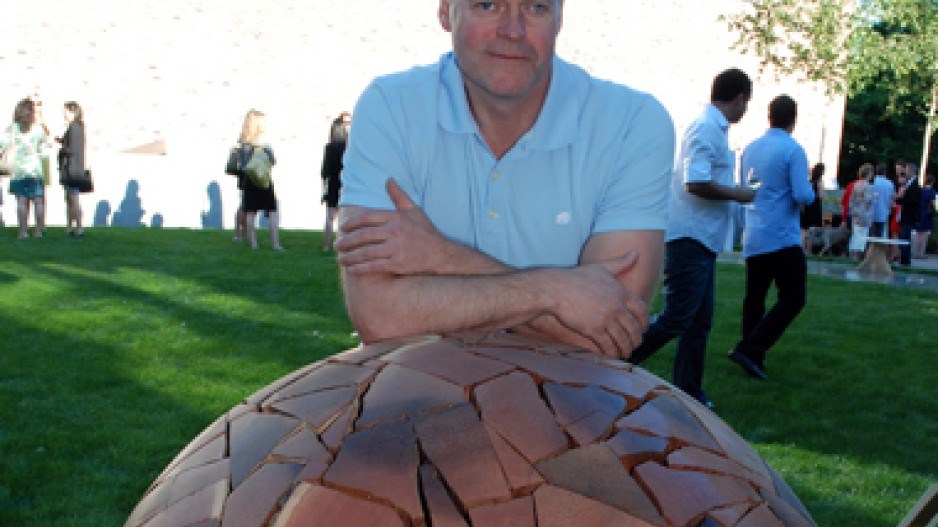BC wood designers know it takes years to break into the Asian market and they are beginning to see their patience rewarded.
"I'm really starting to get rolling over there," said Brent Comber, owner of Brent Comber Originals, a North Vancouver studio with 12 staff that he founded in 1997. "You have to be patient in that market."
To date, his Asia focus has been art-based millwork and freestanding furniture in Japan, and art in South Korea.
"They love anything in wood that relates to nature," he said.
Comber and other local designers credit the industry association BC Wood Specialties Group with putting them in direct contact with potential customers at trade shows and providing marketing services through staff representatives in Japan, South Korea and China.
"BC Wood has been critical to my success," said Comber, who will be going soon to his sixth annual trade show in Tokyo and his third in Seoul.
Only about $50,000 of his company's 2011 revenue of $1 million-plus came from Asia, but Comber told Business in Vancouver there were key developments.
One was an $8,300 contract to create alder wall panels for the first Baumkuchen Café of German-founded, Tokyo-based Juchheim Co., which owns 351 pastry shops.
"They have a model that they want to roll out in Tokyo similar to Starbucks," Comber said. "They want to try a few flagship stores, see how it goes and then open another 70-odd locations and go from there."
Another development came from a contact at the annual Whistler trade show, BC Wood Global Buyers Mission, last September. Comber hopes to get a $200,000 contract with a Japanese designer to place his work in restaurants in Vietnam and a W Hotel – Starwood's luxury boutique hotel brand – in China. "He wants B.C. wood and he wants my design."
In South Korea, Comber's art is attracting galleries. "Rather than architects and designers, art dealers want to start working with me."
Judson Beaumont, owner of Straight Line Designs, has also been going to trade shows in Japan and South Korea with BC Wood. "We're on the cusp of things that are going to happen," he said.
His first success in Japan was creating imaginative cabinets two years ago for Tokyo Disney featuring Mickey Mouse, Minnie Mouse and Donald Duck.
"When the Japanese and Korean people see my furniture they just go crazy. They smile, they want their pictures taken with it," Beaumont said.
He launched his Vancouver studio in 1986 and employs eight designers with revenue last year a little under $1 million. Of that, about $20,000 came from furniture sales at the Asia trade shows.
Beaumont is shifting his emphasis in Asia. "We're trying to work with them more on design," he said.
Straight Line is working with a Japanese sofa manufacturer to design and create prototypes for fold-out sofa beds and couches that will then be produced in Japan.
"And there's a department store that's interested in me doing custom furniture for some art shows over there," Beaumont said.
Furniture is the most value-added sector of B.C.'s secondary wood-products industry, said BC Wood CEO Brian Hawrysh. Established in 1989, Langley-based BC Wood is a non-profit dedicated to helping develop markets. Funding comes from industry and the provincial and federal governments.
"The furniture industry in the province focuses on very, very high-end, custom-designed furniture and furnishings," he said, "mainly because the lower to mid-end of the marketplace has been captured by countries like China and Vietnam."
Hawrysh said smaller companies are now following in the footsteps of designers like Comber and Beaumont with help from BC Wood and its program managers in Asia: Jim Ivanoff in Tokyo, JC Lee in Seoul and Jeff Li in Shanghai, all operating under the umbrella of a national organization, Canada Wood.
"It's about creating awareness, it's about identifying opportunity and it's also about changing perceptions," he said. "For so many years, and it's still the case, B.C. is known as logs and lumber. To change perceptions that there is a thriving design and manufacturing community of higher-end furniture takes some doing."
Hawrysh said the industry "has made significant inroads" in Japan over the past five years. "We're now expanding that activity into Seoul and Shanghai." •




